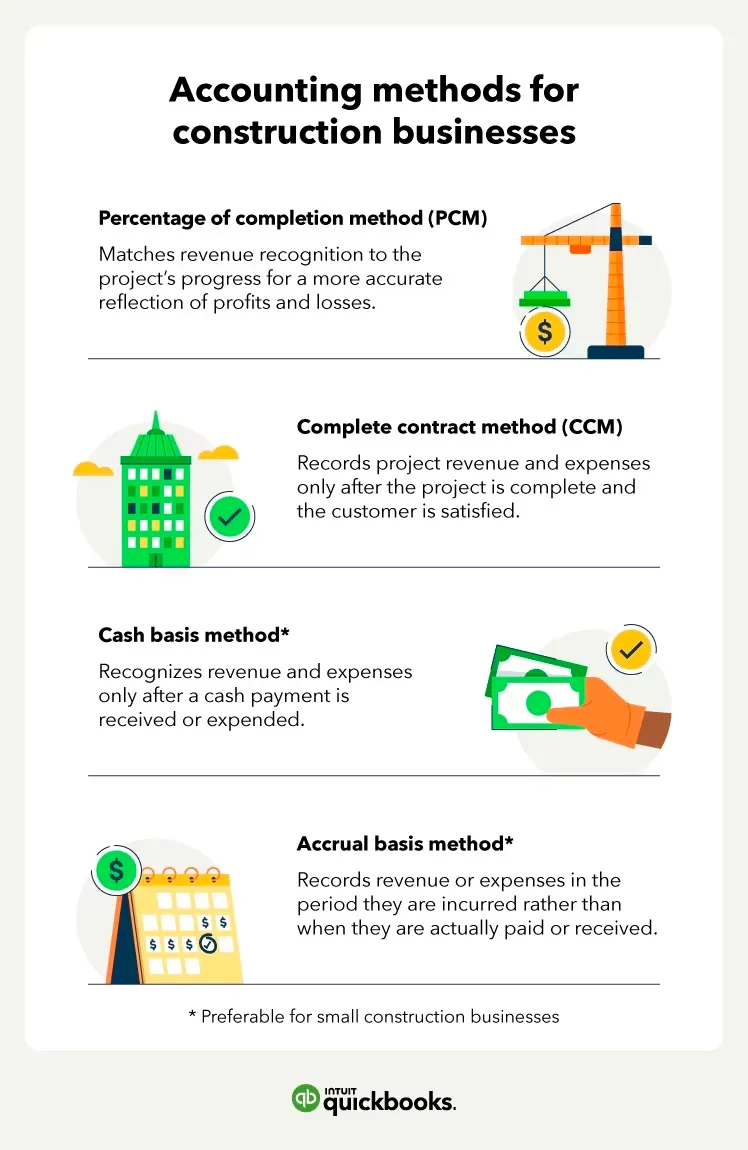Why Construction Accounting is Crucial for Long-Term Business Growth
Why Construction Accounting is Crucial for Long-Term Business Growth
Blog Article
Checking Out the Importance of Building Audit in the Construction Industry
The building market runs under one-of-a-kind financial obstacles that demand a customized approach to accounting. Construction accountancy not only ensures the precision of financial coverage but also plays a critical duty in project monitoring by allowing efficient work setting you back and resource allowance.
Distinct Obstacles of Building Accounting
Regularly, construction bookkeeping presents unique challenges that identify it from other markets. One main difficulty is the complicated nature of building jobs, which commonly involve multiple stakeholders, fluctuating timelines, and varying guidelines. These variables necessitate precise monitoring of expenses related to labor, materials, tools, and expenses to keep project earnings.
Another significant obstacle is the demand for exact work setting you back. Construction companies should assign prices to specific projects precisely, which can be hard due to the long period of time of jobs and the potential for unpredicted costs. This requirement demands robust bookkeeping systems and techniques to guarantee timely and accurate monetary reporting.
Additionally, the building sector is susceptible to change orders and contract adjustments, which can even more make complex monetary monitoring and forecasting. Appropriately accounting for these adjustments is critical to guarantee and stay clear of disputes that projects stay within budget.

Trick Concepts of Building And Construction Audit
What are the fundamental concepts that direct building accountancy? At its core, construction accounting rotates around exact monitoring of prices and incomes related to details tasks. The first concept is the use of task setting you back, which ensures that all expenditures connected to a project-- labor, materials, overhead-- are thoroughly recorded and designated. This permits for exact productivity evaluation at the project degree.
An additional key principle is the application of the percentage-of-completion approach. This method identifies income and expenditures proportionate to the project's progress, supplying a more practical sight of financial performance with time. Furthermore, building and construction bookkeeping stresses the significance of conformity with bookkeeping requirements and laws, such as GAAP, to make certain openness and dependability in economic reporting.
Moreover, capital administration is important, given the usually intermittent nature of building jobs. Timely invoicing and managing payment timetables aid maintain liquidity. Effective budgeting and forecasting are necessary for anticipating job expenses and monetary results, making it possible for better decision-making and resource allowance. These principles collectively develop a robust framework that sustains the special economic needs of the building market.
Advantages of Effective Building And Construction Accounting
Effective building and construction audit offers countless benefits that substantially improve the overall monitoring of jobs. One of the key advantages is enhanced monetary visibility, allowing task supervisors to track expenditures precisely and monitor capital in real-time. This transparency assists in informed decision-making, minimizing the danger of budget plan overruns and making certain that resources are allocated effectively.
In addition, reliable construction accountancy boosts conformity with regulatory requirements and sector standards. By maintaining precise financial records, companies can conveniently give documentation for audits and fulfill contractual commitments. This persistance not just fosters trust fund with clients and stakeholders but additionally minimizes prospective lawful threats.
Additionally, effective audit methods add to far better task forecasting. By analyzing past performance and monetary patterns, building and construction companies can make more accurate predictions relating to future task costs and timelines. construction accounting. This ability improves strategic planning and enables business to respond proactively to market changes
Tools and Software for Construction Audit
A range of specialized tools and software application solutions are offered for construction audit, each designed to improve financial administration processes within the market. These tools promote tracking, reporting, and evaluating economic data certain to construction jobs, guaranteeing precision and conformity with industry criteria.
Leading software options consist of integrated building and construction monitoring systems that encompass job management, accountancy, and budgeting performances. Solutions such this contact form as Sage 300 Construction and Property, copyright for Service Providers, and Perspective Panorama deal features customized to take care of work costing, pay-roll, and invoicing, making it possible for building firms to preserve exact monetary oversight.
Cloud-based applications have actually gotten popularity because of their ease of access and real-time collaboration abilities. Devices like Procore and CoConstruct allow teams to gain access to economic information from several areas, improving interaction and decision-making processes.
In addition, building and construction bookkeeping software application commonly supports conformity with regulatory demands, assisting in audit More about the author tracks and tax coverage. The integration of mobile applications more boosts functional efficiency by allowing area personnel to input data straight, lowering errors and hold-ups.

Ideal Practices for Building And Construction Financial Administration
Successful building audit counts not just on the right devices and software but likewise on the execution of ideal practices for financial administration. To achieve reliable financial oversight, building and construction firms must focus on precise and regular job budgeting. This procedure involves damaging down project costs into in-depth groups, which enables much better tracking and projecting of expenses.
One more important practice is preserving a robust system for invoicing and cash flow monitoring. Timely invoicing ensures that settlements are received immediately, while diligent capital tracking helps protect against liquidity problems. In addition, construction companies need to adopt a rigorous technique to work costing, analyzing the real prices versus budgets to identify variations and readjust strategies accordingly.
Moreover, promoting transparency via thorough economic coverage boosts stakeholder depend on and aids in educated decision-making. Regular financial evaluations and audits can likewise uncover prospective inadequacies and areas for improvement. Constant training and development of financial management abilities among staff make certain that the group stays skilled at browsing the intricacies of building and construction audit. By integrating these finest techniques, building and construction companies can boost their economic stability and drive job success.
Conclusion
In verdict, building bookkeeping serves as a basic component of the construction market, resolving one-of-a-kind obstacles and sticking to essential concepts that boost economic precision - construction accounting. By applying ideal practices, building companies can cultivate stakeholder count on and make notified decisions, ultimately contributing to the overall success and sustainability of jobs within the industry.
Building accounting not just guarantees the accuracy of financial coverage but additionally plays a crucial role in project management by enabling efficient work setting you back and resource allowance. In addition, building and construction accountancy emphasizes the importance of conformity with audit criteria and regulations, such as GAAP, to ensure openness a knockout post and dependability in economic reporting.
Successful building and construction bookkeeping depends not only on the right devices and software application yet likewise on the execution of finest techniques for economic management. Continuous training and advancement of economic management abilities among team guarantee that the group remains proficient at navigating the complexities of building bookkeeping.In conclusion, building and construction bookkeeping offers as a fundamental element of the construction sector, addressing one-of-a-kind obstacles and adhering to key principles that boost monetary precision.
Report this page